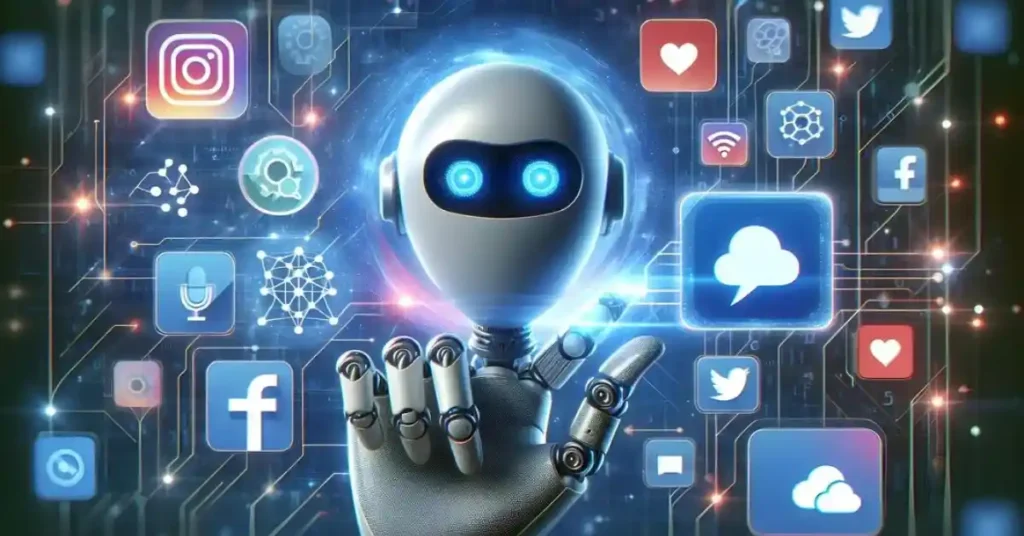Artificial intelligence is revolutionizing various industries, and social media is no exception. AI’s integration into social media platforms has transformed how we interact, share content, and even how businesses operate. This article delves into the significant impact of AI in social media, exploring its benefits, challenges, and future prospects.
How AI is Used in Social Media
- Personalized Content Recommendations: AI analyzes user behaviour, preferences, and interactions to suggest relevant content, improving user engagement and satisfaction.
- Content Creation: AI-powered tools can generate text, images, and even videos, automating content creation processes and saving time for marketers.
- Image and Video Recognition: AI can identify objects, people, and scenes within images and videos, enabling features like image search, automatic tagging, and content moderation.
- Sentiment Analysis: AI analyzes text to understand the emotional tone of social media conversations, helping brands monitor brand reputation and customer sentiment.
- Chatbots and Customer Service: AI-powered chatbots provide instant customer support, answering queries, resolving issues, and improving customer satisfaction.
- Ad Targeting: AI helps optimize ad campaigns by identifying the most relevant audience, improving ad performance, and maximizing ROI.
- Fraud Detection: Artificial intelligence detects fake accounts, spam, and other malicious activities, ensuring a safe and secure social media environment.
Benefits of AI in Social Media

- Enhanced User Experience: Personalized recommendations, improved search, and faster response times create a more enjoyable user experience.
- Increased Efficiency: Automation of tasks like content creation and customer service saves time and resources.
- Data-Driven Insights: AI provides valuable insights into user behaviour, enabling data-driven decision-making.
- Improved Marketing Effectiveness: AI helps optimize ad targeting, content performance, and customer engagement.
Challenges and Considerations
- Privacy Concerns: The use of AI raises concerns about data privacy and security.
- Job Displacement: Automation of tasks through AI could lead to job losses in certain areas.
The Future of AI in Social Media
Artificial intelligence is constantly evolving, and its impact on social media will continue to grow. We can expect to see further advancements in areas like augmented reality, virtual reality, and natural language processing. As Artificial intelligence becomes more sophisticated, it will play an even more critical role in shaping the future of social media.
Disadvantages of AI in Social Media
While AI offers numerous benefits to social media, it also comes with its share of drawbacks. Here are some key disadvantages:
Privacy Concerns
- Data Collection: AI relies heavily on user data for personalization, raising concerns about privacy breaches and misuse of personal information.
- Surveillance Capitalism: The extensive data collection can contribute to a surveillance-based economy, where user behaviour is monitored and exploited for profit.
Algorithmic Bias
- Reinforcement of Prejudices: AI algorithms can inadvertently perpetuate existing biases in society, leading to discriminatory content recommendations and limited exposure to diverse perspectives.
- Filter Bubbles: Personalized content recommendations can create echo chambers, isolating users within their own viewpoints and hindering critical thinking.
Spread of Misinformation
- Deepfakes and Fake News: AI can be used to create highly convincing fake content, making it difficult to distinguish between truth and falsehood.
- Amplification of Misinformation: AI-powered algorithms can inadvertently amplify the spread of misinformation by recommending it to wider audiences.
Job Displacement
- Automation of Tasks: AI can automate various tasks in social media management, potentially leading to job losses for content creators, customer service representatives, and other roles.
Lack of Human Connection
- Overreliance on Automation: Excessive use of Artificial intelligence can lead to a decline in authentic human interaction and connection on social media platforms.
- Depersonalization: AI-driven interactions may feel impersonal and robotic, diminishing the social aspect of social media.
Economic Inequality
- Digital Divide: The benefits of AI in social media may not be equally accessible to all, exacerbating the digital divide and creating further economic inequality.
It’s important to note that these are potential disadvantages, and the extent to which they materialize depends on how AI is developed, implemented, and regulated.
Free AI Tools for Social Media
While there’s a growing number of AI tools available for social media, many offer free tiers or limited free versions. Here are some popular options:
Content Creation and Management
- SocialBee: Provides a free AI post generator to help you create engaging content.
- Predis.ai: Offers free AI-generated posts, including carousels, videos, and captions.
- Canva: While primarily a design tool, it incorporates AI for image suggestions and text suggestions.
Social Listening
- Hootsuite: Provides free social listening tools to monitor brand mentions and hashtags.
- Mention: Offers a free plan with limited features for social listening.
Other Useful Tools
- Jasper.ai: Primarily a copywriting tool, but offers some free features for generating social media content.
- Grammarly: While not specifically for social media, it can help improve the quality of your posts.
Conclusion
Artificial intelligence is undoubtedly a game-changer in the world of social media. From personalized content and customer service to predictive analytics and influencer marketing, AI is enhancing the way businesses and users interact on these platforms. As technology continues to advance, the role of AI in social media will expand, offering even more innovative solutions for brands and consumers alike.





